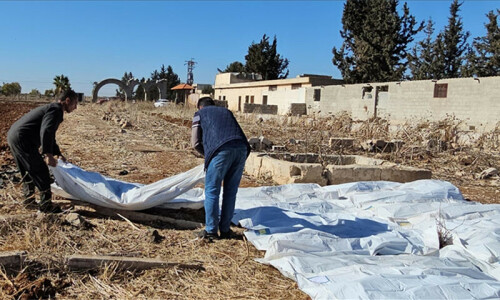THE increase of Rs600 in per 40kg support price of wheat by the Sindh government looks attractive to farmers on the face of it. However, this increase of almost 43 per cent will not benefit consumers in terms of flour prices as they will continue to pay Rs64 to Rs70 per kilogram of flour.
Interestingly, the farmers might not be able to get this support price. The Sindh government will procure only 1.4m tonnes of wheat out of the 3.8-3.9m tonnes of the grain the province is likely to produce. Additionally, the inter-provincial smuggling of wheat from Punjab to Sindh would be now on the cards if federal and provincial governments stick to their respective prices.
The Sindh government announced wheat support price of Rs2,000 for procurement of 1.4m tonnes of wheat in the 2020-21 season while the federal government has already approved Rs1,650 per 40kg. An increase of some 43pc is seen for the first time in support price, else it was increased to a certain limit only.
The Sindh food department was procuring wheat at rate of Rs1,300 per 40kg between 2014-15 to 2017-18. In 2018-19, it didn’t procure the grain and last year it failed to meet the procurement target. “Last year we had to import 0.117m tonnes from Ukraine. The wheat is of inferior quality and can’t be consumed unless mixed with local crop,” said an official on Friday.
Earlier, the PPP government in 2008 had increased prices from Rs650 to Rs950.
“Videos of rotten wheat have gone viral in Tando Allahyar and other areas. Even animals won’t consume it,” said Sindh Chamber of Agriculture leader Nabi Bux Sathio. A senior administrative officer subscribed to Mr Sathio’s view on the condition of anonymity, saying wheat supplied at controlled rate is substandard.
Hard-pressed small farmers
“This Rs2,000 support price would hardly be implemented. Small farmers are always hard pressed to free up their land for cultivating other crops so they will be selling their grain at a rate offered by traders, who now know wheat from Punjab will be reaching here somehow therefore they are not panicked,” the officer said. The same traders, he said, would then sell wheat to the food department for Rs2,000.
Currently, price of a 100kg wheat bag is said to be Rs5,500. According to market sources, wheat price was Rs5,400 per 100kg last month, though the grain remained unavailable. The department is releasing wheat to flour mills and chakki owners (mostly in parts of Sindh other than Karachi) at issue price of Rs3,687 per 100kg.
With Rs2,000 support price, 100kg bag would be sold at Rs5,000. Last year, the provincial food department procured wheat at Rs1,400 per 40kg or Rs3,500 per 100kg. Sindh Abadgar Board (SAB) vice president Mehmood Nawaz Shah noted that given procurement price last year, flour consumers should not pay more than Rs46 to Rs47 per kilo, but it remained pegged over Rs60.
“Growers in many cases sold wheat at lesser rates than the support price of Rs1,400 last year due to the Covid-19 pandemic. The government had dropped mandatory condition of form-VII on farmer’s part to meet the target but in vain.” Mr Shah said.
Sindh Food Secretary Haleem Sheikh is confident that wheat procurement would begin by March 15. Some 150,000 carryover stocks would be available with department by March, he said, adding that 0.8m tonnes pertained to past stocks recorded until January, but since then releases were continuing.
Uniform price sought
Meanwhile, Pakistan Flour Mills Association Sindh Chairman Haji Yusuf called for uniform support price for entire country. “It is a big jump of Rs1,500 jump and this must be reviewed,” he said.
Atta Chakki Owners Social Welfare Association president Hafeez Ahmed urged the apex court to take notice of this raise in price of wheat, claiming that the “Sindh government aims to benefit a few privileged families through this support price.”
However, food officials said the Sindh government currently has a Rs100bn liability of the State Bank of Pakistan till February against Rs130bn commodity credit limit (CCL). These Rs100bn liabilities pertained to last 12 years. “We will be paying Rs18bn out of the Rs100bn after releasing stocks to millers and chakki owners while Rs82bn will be due,” one official said. The department would require Rs70bn for 2020-21 procurement operations that would again take its overall dues to Rs152bn. “That’s why Food Department has requested Finance Department to release Rs45bn allocated for this year’s procurement exercise. It will enable department to pay Rs22bn to SBP to remain within its Rs130bn CCL,” he added.
Published in Dawn, February 13th, 2021














































